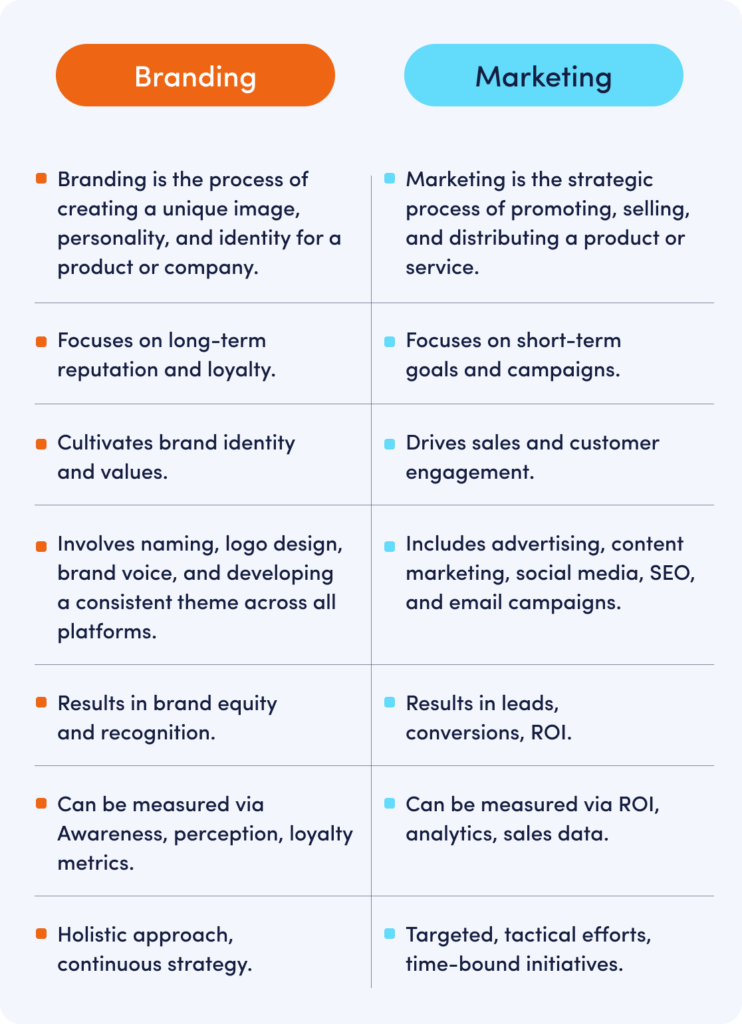- Differences Between a Marketing Manager and a Brand Manager
- Who earns more, brand manager or marketing manager?
- Is a marketing manager more senior than a brand manager?
- What is the difference between brand and marketing?
- How much does a brand manager make compared to a marketing manager?
-
Frequently Asked Questions from Our Community
- What are the primary responsibilities of a Marketing Manager versus a Brand Manager?
- How do the goals of a Marketing Manager differ from those of a Brand Manager?
- What skills are essential for a Marketing Manager compared to a Brand Manager?
- How do the day-to-day activities of a Marketing Manager and a Brand Manager differ?
In the dynamic world of business, the roles of Marketing Manager and Brand Manager are often intertwined, yet they serve distinct purposes within an organization. While both positions focus on driving business success, their responsibilities, objectives, and areas of expertise differ significantly. A Marketing Manager oversees the broader strategy of promoting products or services, focusing on customer acquisition, market research, and campaign execution. On the other hand, a Brand Manager is dedicated to shaping and maintaining the identity, perception, and loyalty of a specific brand. Understanding these differences is crucial for businesses aiming to allocate resources effectively and achieve long-term growth.
Differences Between a Marketing Manager and a Brand Manager
Marketing Managers and Brand Managers are both crucial roles in any organization, but they have distinct responsibilities and focus areas. While they often collaborate, their objectives and day-to-day tasks differ significantly. Below, we explore the key differences between these two roles.
See Also What Are Some of the Best Guerrilla Marketing Campaigns You've Ever Seen?
What Are Some of the Best Guerrilla Marketing Campaigns You've Ever Seen?1. Core Responsibilities
The Marketing Manager is responsible for overseeing the overall marketing strategy of a company. This includes planning, executing, and monitoring campaigns to drive sales and increase market share. On the other hand, the Brand Manager focuses on maintaining and enhancing the brand's image, ensuring consistency across all platforms and touchpoints.
| Marketing Manager | Brand Manager |
|---|---|
| Develops marketing strategies | Manages brand identity |
| Focuses on sales and revenue | Focuses on brand perception |
2. Scope of Work
The Marketing Manager has a broader scope, dealing with multiple products or services and often working across various markets. The Brand Manager, however, typically focuses on a specific brand or product line, ensuring it aligns with the company's overall vision and values.
See Also In Your Opinion, What Are Some of the Best Gaming Marketing Campaigns?
In Your Opinion, What Are Some of the Best Gaming Marketing Campaigns?| Marketing Manager | Brand Manager |
|---|---|
| Handles multiple products/services | Focuses on a single brand/product line |
| Works across different markets | Ensures brand consistency |
3. Key Performance Indicators (KPIs)
For a Marketing Manager, KPIs often include metrics like sales growth, customer acquisition, and return on investment (ROI). In contrast, a Brand Manager measures success through brand awareness, customer loyalty, and brand equity.
| Marketing Manager | Brand Manager |
|---|---|
| Sales growth | Brand awareness |
| Customer acquisition | Customer loyalty |
| ROI | Brand equity |
4. Collaboration with Other Departments
The Marketing Manager frequently collaborates with sales, product development, and finance teams to align marketing efforts with business goals. The Brand Manager works closely with creative teams, public relations, and customer service to ensure the brand's message is consistent and resonates with the target audience.
See Also Best Way to Set Up Landing Pages to Capture Email Leads?
Best Way to Set Up Landing Pages to Capture Email Leads?| Marketing Manager | Brand Manager |
|---|---|
| Sales, product development, finance | Creative teams, PR, customer service |
| Aligns with business goals | Ensures consistent messaging |
5. Long-Term vs. Short-Term Focus
A Marketing Manager often has a short- to medium-term focus, aiming to achieve immediate sales targets and market penetration. The Brand Manager, however, takes a long-term approach, building and maintaining the brand's reputation over time.
| Marketing Manager | Brand Manager |
|---|---|
| Short- to medium-term goals | Long-term brand reputation |
| Immediate sales targets | Sustained brand loyalty |
Who earns more, brand manager or marketing manager?

 Best Platform/App for a Micro-Influencer Marketing Campaign?
Best Platform/App for a Micro-Influencer Marketing Campaign?Salary Comparison: Brand Manager vs. Marketing Manager
The salary difference between a Brand Manager and a Marketing Manager depends on factors such as industry, experience, and location. Generally, Brand Managers tend to earn slightly more than Marketing Managers due to their specialized focus on brand strategy and equity. However, this can vary significantly based on the organization's size and market.
- Industry Influence: Industries like technology and consumer goods often pay higher salaries for both roles.
- Experience Level: Senior-level professionals in either role can command higher salaries.
- Geographic Location: Salaries are typically higher in metropolitan areas with a high cost of living.
Key Responsibilities of a Brand Manager
A Brand Manager is responsible for maintaining and enhancing a brand's image and market position. Their duties often include:
See Also Gen Z Broke the Marketing Funnel
Gen Z Broke the Marketing Funnel- Brand Strategy: Developing long-term strategies to grow brand equity.
- Market Research: Analyzing consumer trends and competitor activities.
- Campaign Management: Overseeing marketing campaigns to ensure brand consistency.
Key Responsibilities of a Marketing Manager
A Marketing Manager focuses on broader marketing activities, including:
- Campaign Planning: Designing and executing marketing campaigns across multiple channels.
- Budget Management: Allocating resources to maximize ROI.
- Team Leadership: Managing a team of marketers to achieve organizational goals.
Factors Affecting Salary Differences
Several factors influence the salary disparity between Brand Managers and Marketing Managers:
- Specialization: Brand Managers often require deeper expertise in brand strategy, which can command higher pay.
- Scope of Work: Marketing Managers may handle a wider range of tasks, which can impact salary levels.
- Demand: Industries with a high demand for brand-specific expertise may offer higher salaries for Brand Managers.
Career Growth Opportunities
Both roles offer significant career growth potential, but the paths differ:
- Brand Manager: Often progresses to roles like Senior Brand Manager or Director of Brand Strategy.
- Marketing Manager: Can advance to positions such as Marketing Director or Chief Marketing Officer (CMO).
- Cross-Functional Roles: Both roles can transition into broader leadership positions within the organization.
Is a marketing manager more senior than a brand manager?

What is the Role of a Marketing Manager?
A marketing manager oversees the entire marketing strategy of a company or product line. Their responsibilities include:
- Developing marketing plans to achieve business objectives.
- Managing budgets and allocating resources effectively.
- Leading cross-functional teams to execute campaigns.
- Analyzing market trends and adjusting strategies accordingly.
- Collaborating with senior leadership to align marketing goals with overall business goals.
What is the Role of a Brand Manager?
A brand manager focuses on maintaining and enhancing the perception of a specific brand. Their key duties include:
- Developing brand strategies to strengthen market positioning.
- Overseeing brand messaging across all channels.
- Monitoring brand performance and customer feedback.
- Collaborating with creative teams to produce consistent branding materials.
- Ensuring brand compliance across all marketing efforts.
Is a Marketing Manager More Senior Than a Brand Manager?
In most organizational structures, a marketing manager is considered more senior than a brand manager. This is because:
- Marketing managers oversee multiple brands or product lines, while brand managers focus on a single brand.
- Marketing managers have broader responsibilities, including budget management and strategic planning.
- Brand managers often report to marketing managers or higher-level executives.
- Marketing managers are involved in high-level decision-making, while brand managers execute specific brand strategies.
- Marketing managers typically have more experience and a wider scope of influence within the organization.
Key Differences in Responsibilities
The responsibilities of a marketing manager and a brand manager differ significantly:
- Marketing managers focus on overall market strategy, while brand managers concentrate on a single brand's identity.
- Marketing managers handle larger budgets and resources, whereas brand managers work within allocated budgets for their brand.
- Marketing managers collaborate with senior leadership, while brand managers often work with creative and operational teams.
Career Progression: From Brand Manager to Marketing Manager
Many professionals start as brand managers and progress to marketing managers. This progression involves:
- Gaining experience in managing a brand's performance and strategy.
- Developing leadership skills to oversee larger teams and projects.
- Expanding knowledge of broader marketing strategies and market dynamics.
- Building relationships with senior stakeholders to prepare for higher-level roles.
- Demonstrating success in achieving brand objectives to qualify for promotion.
What is the difference between brand and marketing?

What is a Brand?
A brand represents the identity, values, and perception of a company or product in the minds of consumers. It encompasses the emotional and psychological relationship a customer has with a business. Key elements of a brand include:
- Logo and Visual Identity: The visual elements that make a brand recognizable.
- Core Values: The principles and beliefs that guide the company.
- Customer Experience: How customers feel when interacting with the brand.
What is Marketing?
Marketing refers to the strategies and tactics used to promote a product, service, or brand to a target audience. It involves activities designed to attract, engage, and convert potential customers. Key components of marketing include:
- Advertising: Paid promotions to increase visibility.
- Content Creation: Developing valuable content to engage audiences.
- Sales Strategies: Techniques to drive conversions and revenue.
Key Differences Between Brand and Marketing
While brand and marketing are interconnected, they serve distinct purposes. The brand is the foundation, while marketing is the tool to communicate and promote it. Key differences include:
- Purpose: A brand defines identity; marketing promotes it.
- Longevity: A brand is long-term; marketing campaigns are often short-term.
- Focus: Branding focuses on perception; marketing focuses on action.
How Branding Influences Marketing
A strong brand enhances the effectiveness of marketing efforts by providing a clear and consistent message. This relationship is critical because:
- Trust Building: A well-established brand builds trust, making marketing more persuasive.
- Consistency: Marketing campaigns aligned with the brand identity resonate better with audiences.
- Emotional Connection: A strong brand creates emotional ties, increasing the impact of marketing.
Why Both Brand and Marketing Are Essential
Both brand and marketing are crucial for business success. They work together to achieve different but complementary goals:
- Brand Awareness: Marketing helps increase visibility, while branding ensures recognition.
- Customer Loyalty: A strong brand fosters loyalty, and marketing nurtures relationships.
- Revenue Growth: Marketing drives sales, and branding ensures repeat business.
How much does a brand manager make compared to a marketing manager?

What is the Average Salary of a Brand Manager?
The average salary of a brand manager varies depending on factors such as experience, location, and industry. In the United States, a brand manager typically earns between $70,000 and $120,000 annually. Entry-level brand managers may start at the lower end of this range, while those with extensive experience or working in high-demand industries can earn significantly more.
- Experience Level: Entry-level brand managers earn less, while senior-level professionals command higher salaries.
- Industry: Industries like technology and consumer goods often pay higher salaries compared to non-profits or smaller companies.
- Location: Salaries in major metropolitan areas like New York or San Francisco tend to be higher due to the cost of living.
What is the Average Salary of a Marketing Manager?
A marketing manager generally earns a slightly higher salary compared to a brand manager. In the U.S., the average salary for a marketing manager ranges from $80,000 to $130,000 per year. This role often involves broader responsibilities, which can justify the higher pay scale.
- Scope of Work: Marketing managers oversee multiple campaigns and strategies, which can increase their earning potential.
- Industry Demand: High-demand industries like tech and healthcare often offer higher salaries for marketing managers.
- Geographic Location: Similar to brand managers, marketing managers in urban areas earn more due to higher living costs.
Key Differences in Responsibilities Between Brand and Marketing Managers
While both roles are crucial to a company's success, their responsibilities differ significantly. A brand manager focuses on maintaining and enhancing the brand's image, while a marketing manager oversees the overall marketing strategy and execution.
- Brand Managers: Concentrate on brand positioning, messaging, and customer perception.
- Marketing Managers: Handle broader tasks like campaign planning, budget management, and team coordination.
- Overlap: Both roles may collaborate on campaigns, but their primary focus areas remain distinct.
Factors Influencing Salary Differences
Several factors contribute to the salary differences between brand and marketing managers. These include the scope of responsibilities, industry demand, and the level of expertise required.
- Responsibility Scope: Marketing managers often have a wider range of duties, justifying higher pay.
- Industry Demand: Certain industries value marketing expertise more, leading to higher salaries.
- Expertise Level: Advanced skills in data analysis or digital marketing can increase earning potential for both roles.
Career Growth and Earning Potential
Both brand and marketing managers have strong career growth prospects, but their earning potential can vary based on career progression and specialization.
- Brand Managers: Can advance to roles like Senior Brand Manager or Director of Brand Strategy, with salaries exceeding $150,000.
- Marketing Managers: May progress to positions such as VP of Marketing or Chief Marketing Officer, with salaries reaching $200,000 or more.
- Specialization: Focusing on high-demand areas like digital marketing or analytics can further boost earnings.
Frequently Asked Questions from Our Community
What are the primary responsibilities of a Marketing Manager versus a Brand Manager?
The Marketing Manager focuses on the overall marketing strategy of a company, including planning, executing, and monitoring campaigns to drive sales and customer engagement. They often oversee multiple products or services and work on broader goals like market penetration and revenue growth. On the other hand, the Brand Manager is responsible for maintaining and enhancing the brand identity of a specific product or service. Their role involves ensuring consistency in messaging, managing brand perception, and developing strategies to strengthen the brand's position in the market.
How do the goals of a Marketing Manager differ from those of a Brand Manager?
The Marketing Manager aims to achieve business objectives such as increasing market share, generating leads, and boosting sales across the company's portfolio. Their goals are often tied to measurable outcomes like revenue and customer acquisition. In contrast, the Brand Manager focuses on building and maintaining the brand equity of a specific product or service. Their goals revolve around creating a strong emotional connection with the target audience, ensuring brand loyalty, and differentiating the brand from competitors.
What skills are essential for a Marketing Manager compared to a Brand Manager?
A Marketing Manager requires strong skills in data analysis, strategic planning, and cross-functional collaboration to manage diverse marketing campaigns and align them with business objectives. They must also be adept at budgeting and performance tracking. Meanwhile, a Brand Manager needs exceptional creative thinking, communication skills, and a deep understanding of consumer behavior to craft compelling brand stories and ensure consistent messaging across all touchpoints. They often work closely with design and advertising teams to bring the brand vision to life.
How do the day-to-day activities of a Marketing Manager and a Brand Manager differ?
The Marketing Manager typically spends their day analyzing market trends, coordinating with sales teams, and overseeing the execution of marketing campaigns. They may also review performance metrics and adjust strategies to meet business goals. In contrast, the Brand Manager focuses on activities like monitoring brand performance, collaborating with creative teams on advertising materials, and conducting market research to understand consumer perceptions. Their role is more centered on ensuring the brand's voice and image remain consistent and resonate with the target audience.
Leave a Reply


Articles of interest